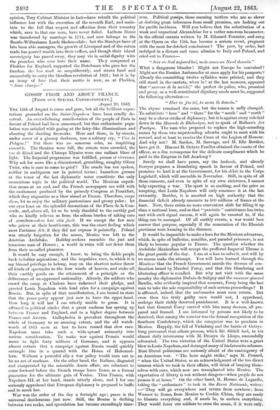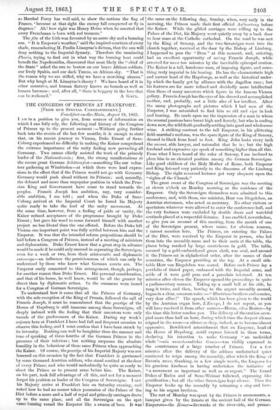GOSSIP FROM AND ABOUT FRANCE. [FROM OUR SPECIAL CORRESPONDENT.] August
20, 1863. THE 15th of August is come and gone, but all the brilliant expec- tations grounded on the Saint-Napoleon have been cruelly de- ceived. An overwhelming manifestation of the people of Paris in . favour of Poland had been announced, but that enthusiastic popu- lation was satisfied with gazing at the fairy-like illuminations and cheering the dazzling fireworks. Here and there, in by-streets, under cover of a gloomy darkness, rose a solitary cry, " Vire la Pologne!" But there was no sonorous echo, no inspiriting ensemble. The theatres were full, the streets were crowded, the rue de Ricoh and the Champs Elysees were one radiant blaze of
light. The Imperial programme was fulfilled, panem et circenses. Why ask for more like a discontented, grumbling, naughty Oliver Twist, who is sure to come to grief? The oracle has not spoken, neither in ambiguous nor in pointed terms ; -hazardous guesses at the tenor of the last diplomatic notes constitute the only momentous topic in the political world. The Mexican expedi- tion seems at an end, and the French newspapers are wild with
the excitement produced by the princely Congress at Frankfort, which they stigmatize as a blow aimed at France. Therefore, carpe diem, let us enjoy the military pantomimes and greasy poles ; let our eyes feast on the splendid decorations of the Place de la Con- corde, and, above all, let us be truly thankful to the earthly god who so kindly relieves us from the odious burden of taking care of ourselves—deer hz-c otia fecit. If we except the few men who grieve at their heart's core, this was the exact feeling which most Parisians felt, if they did not express it pointedly. Poland was utterly forgotten for the nonce, Mexico was left to the Austrian Archduke. Holiday-seekers resemble the just and tenacious man of Horace ; a world in ruins -will not deter them from their so-called pleasures.
It would be easy enough, I know, to bring the fickle people back to loftier aspirations ; and the impulsive race, to which it is my blessed privilege to belong, may on the shortest notice throw all kinds of spectacles to the four winds of heaven, and stake all their earthly goods on the attainment of a principle or the deliverance of an oppressed nationality. Already, the soldiers who crowd the camp at Chalons have redeemed their pledge, and greeted Louis Napoleon with loud cries for a campaign against Russia. But, in spite of that manifestation, I mu bound to state that the peace party appear just now to have the upper hand. How long it will last I am utterly unable to guess. It is affirmed in political circles that a great coolness has sprung up between France and England, and to a higher degree between France and Austria. Gallophobia is prevalent throughout the whole of Germany to an amazing extent, and the old watch- words of 1813 seem at last to have roused that slow race. Napoleon must take such a wide-spread animosity into serious consideration. To make war against Prussia would mean to fight forty millions of Germans, and it appears almost certain that a campaign against Russia would quickly entangle him in a quarrel with the House of Hohenzol- lern. Without a powerful ally a war policy would turn out to be an act of madness. On the other hand, the Italians, disgusted and exasperated by the miserable Aunis affair, are reluctant to come forward before the French troops leave Rome, as a formal guarantee for the ultimate gain of Venice. Thus France, with Napoleon III, at her head, stands utterly alone, and I for one seriously apprehend that European diplomacy is prepared to baffle and to mock her.
War was the order of the day a fortnight ago ; peace is the universal desideratum just now. Still, the Bourse is drifting between two rocks, and speculation has become exceedingly timo-
rous. Political gossips, those amusing tattlers who are so clever at deriving grad inferences from small premises, are looking out for pacific incidents. Will you believe that the substitution of a weak and unpoetical Alexandrine for a rather sonorous hexameter, in the official cantata written by M. Edouard Fournier, and sung at the Opera on the 15th, has become a serious event, pregnant with the most far-fetched conclusions ? The poet, by order, had indulged in a distant and tame allusion to Italy and Poland, and cried out to France— "So is an Sad aujourdhui, mais cours au Nord demain."
What a dangerous blunder ! Might not Europe be convulsed? Might not the Russian Ambassador at once apply for his passports? Already the committing twelve syllables were printed, and they still stand in the cantata, when lo ! at the last moment, appeared that " saureur de la societe," the prefect de police, who, prosaical and prosy, as a well-constituted dignitary needs must be, suggested the following alteration :— tu fee ici, tu seras 12t demain."
The rhyme remained the same, but the reason is sadly changed. To substitute " here " and " there " for the " south " and " north " may be a clever stroke of diplomacy, but it is against every rule laid down in the Man eels de Rhelorigue, not to speak of Boile,au's Art Poetigue. The man who proposed to replace the high-sounding nouns by these two unpretending adverbs ought to meet with his reward, and at least to receive the Cross of the Legion of Honour. And why not? M. Sardon, M. Sauvage, and M. Elie Berthet, have got it. Has not M. Octave Feuillet obtained the rosette of the officer, as a due recompense for the delicate compliment which he paid to the Empress in full Academy ?
Surely we shall have peace, say the badauds, and already Berryer prepares a thundering speech in favour of Poland, and promises to hurl it at the Government, for his Milt in the Corps Legislatif, which will assemble in November. Still, in spite of all these rumours, and even in spite of my own strictures, I cannot help expecting a war. The sport is so exciting, and the price so tempting, that Louis Napoleon will only renounce it at the last extremity. Besides, it is asserted on high authority that the financial deficit already amounts to 500 millions of francs at the least. Now, there exists no more convenient shift for fining it up than a national loan, and as that " patriotic " contrivance has twice met with such signal success, it will again be resorted to, if the thing can be managed. Of all earthly events, a war would best answer that purpose, especially if the annexation of the Rhenish provinces were looming in the distance.
It would be impossible to make a loan for the Mexican adventure, which, in spite of bulletins, notables, and paraded prisoners, is not likely to become popular in France. The question whether the Archduke Maximilian will accept the proffered Imperial Throne is the great puzzle of the day. I am at a loss to solve it, and will by no means make the attempt. You will have learned through the Moniteur that the French Government annuls the decrees of con- fiscation issued by Marshal Forey, and that this blundering and blustering officer is recalled. But why not visit with the same penalty the diplomatist Dubois de Saligny and the recereur-general Baudin, who evidently inspired that measure, Forey being the last man to take the sole responsibility of such serious proceedings ? It is affirmed, indeed, that the ambassador must soon return. But even then the truly guilty men would not, I apprehend, undergo their richly deserved punishment. It is a well-known fact that General Forey carried with him many decrees, all pre- pared and framed. I am informed by persons not likely to be deceived, that among the number was the formal recognition of the Southern Confederacy, which the conqueror was to proclaim in Mexico. Happily, the fall of Vicksburg and the battle of Gettys- burg prevented that odious process, which Mr. Slidell had, in his almost daily intercourse with M. Drouyn de Lhuys, successfully advocated. The two victories of the United States were a great blow to Louis Napoleon, and deranged many of hisfavourite schemes. Most liberal politicians are seriously afraid of the contingency of an American war. "The hour might strike," says M. Pessard, "when the United States, as an acknowledgment of the too direct interest which we took in their affairs, will think of busying them- selves with ours, which now are transplanted into Mexico. The exportation of liberty is not without dangers—when people do not possess it at home." On the other hand, M. Horace de Lagardie, taking the " enthusiasts " to task in the Revue Nationale, writes : —" They will go everywhere and return from nowhere ; from Warsaw to Rome, from Mexico to Cochin China, they are ready to liberate everything and, if needs be, to enslave everything. They would force our soldiers to cross the ocean, if it were only,
as Marshal Forey has well said, to show the nations the flag of France, because at that sight the enemy fall conquered or fly in disgrace.' Ah ! how right was Henry Heine when he asserted that every Frenchman is born with red trousers."
The fête of the 15th was favoured by an azure sky and a beaming sun. "It is Emperor's weather," said the inspired courtiers of every shade, remembering M. Paulin Limayrak's dictum, that the sun will deny nothing to the Imperial dynasty. Therefore the unmincing Phar.s, trying to find out in what way the burning heat could benefit the Napoleonides, discovered that most likely the "chief of the State" asked the sun to bestow on our brave African soldiers, our lively Spahis, and our dark Turcos, an African sky. "That is the reason why we are stifled, why we have a scorching sirocco." But why laugh at M. Limayrae's theory ? We have heard of it in other countries, and human flattery knows no bounds as well as human baseness ; and, after all, "there is beggary in the love that































 Previous page
Previous page